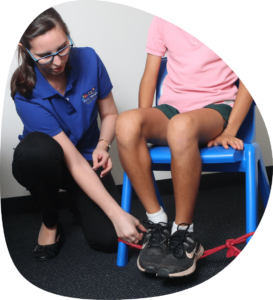Occupational therapy plays a vital role in supporting the development and well-being of children with Autism Spectrum Disorder (ASD). By addressing sensory, motor, and cognitive challenges, occupational therapists empower autistic children to enhance their functional abilities and engage in...
 Occupational therapy plays a vital role in supporting the development and well-being of children with Autism Spectrum Disorder (ASD). By addressing sensory, motor, and cognitive challenges, occupational therapists empower autistic children to enhance their functional abilities and engage in their life whole heartedly. In this blog, we will explore the significant impact of occupational therapy on autistic children and how it promotes their independence and participation in daily activities.
Occupational therapy plays a vital role in supporting the development and well-being of children with Autism Spectrum Disorder (ASD). By addressing sensory, motor, and cognitive challenges, occupational therapists empower autistic children to enhance their functional abilities and engage in their life whole heartedly. In this blog, we will explore the significant impact of occupational therapy on autistic children and how it promotes their independence and participation in daily activities.
Autistic children may experience a number of challenges that impact their participation in their occupations. These challenges may include:
Sensory Processing. Imagine an autistic child who is unable to attend school assembly to receive their ‘Student of the Week’ award because the room is too noisy. Motor Skill Development. Imagine an autistic child who is unable to access the playground at school because they find it hard to climb up the stairs, and sliding down the slide brings on waves of anxiety. Social Skills. Imagine an autistic child who would like to make friends at school but they get so excited about talking about their special interest, they often forget to ask others about their interests. Executive Functioning. Imagine an autistic child who needs to get to soccer training but finds it difficult to remember all the items that need to go in their training bag.With neurodiversity becoming more widely accepted across communities, occupational therapists can work with autistic children and their families to advocate for neurodiverse needs in a neurotypical world. Occupational therapists can provide education, training, and guidance to parents and teachers, helping them to understand the autistic child’s unique strengths and challenges for continued support at home and school. Intervention for an autistic child and their family may look like:
Exploring their sensory preferences and trialling strategies to meet these needs across their day Monitoring brain energy levels and capacity to engage in occupations to avoid autistic burnout Developing functional fine motor skills so they can tie their own shoelaces Psychoeducation around the body cues related to and managing anxiety Building interoceptive awareness to support independent toileting Supporting social experiences to develop and maintain friendships Parent coaching and neurodiversity advocacy across environmentsTogether with families, teachers, and other health professionals, occupational therapists can contribute significantly to the well-being and success of autistic children. A child being diagnosed with autism is a milestone in a family’s journey and occupational therapists can be a support during all stages of that journey.









